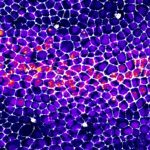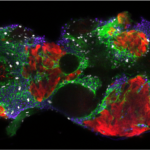Présentation
Despite the detailed characterisation of the molecular players of apoptosis, its orchestration and fine regulation in multicellular contexts is not well understood. While apoptosis is often considered as a simple binary process, there are nowadays many evidences showing that apoptosis is a complex decision making, where cells can undergo transient caspase activation without proceeding to death. This is in agreement with the multiple non-apoptotic functions of caspases and the architecture of the apoptotic pathway which includes several negative feedback loops. This complexity increases further in epithelial cells, where cell clearance requires orchestration of successive remodelling events necessary to extrude the cell from the epithelial layer without impairing tissue barrier function.
We recently showed that cell delaminations in the Drosophila pupal notum always require effector caspases and that caspase activity always precedes delamination. These observations suggest that yet uncharacterized effector caspase substrate(s) are required for delamination and that the effector caspases orchestrate all the remodelling events of apoptosis (such as delamination, DNA compaction, nucleus and cell fragmentation). Moreover, we measured very various lagtimes between the onset of caspase activation and delamination (30 min to several hours) and also observed transient caspase activation which do not lead to cell delamination. As such, we decided to better characterize the decision making leading to irrerversible apoptosis and to dissect the orchestration of the different remodeling steps triggered by caspases. We are currently focusing on four aims :
- Finding new caspase substrates required for cell delamination
- Dissecting the mechanism that regulates the successive apoptotic remodelling events
- Understanding the cell decision making leading to irreversible apoptosis
- Studying the consequences of impaired cell delamination for epithelial homeostasis.
We combine quantitative live imaging, proteomics, genetic, optogenetic, cell biology and theoretical approaches to build a predictive framework that will help to understand the orchestration of apoptosis in a living epithelium.
Live imaging of caspase activation in the pupal notum through a FRET sensor (“cold colours”)
Transient caspase activation in epithelial cells (Drosophila pupal notum), caspase activation leads to GFP relocation to the nucleus.





